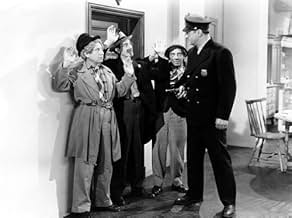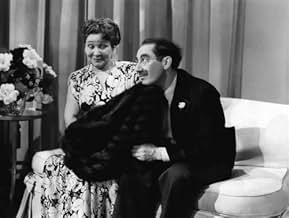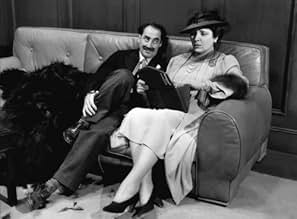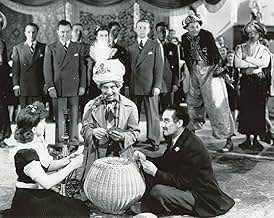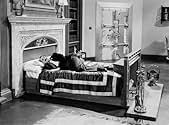VALUTAZIONE IMDb
6,5/10
5647
LA TUA VALUTAZIONE
Aggiungi una trama nella tua linguaA detective is hired to protect the life of a singer who has recently inherited a department store, from the store's crooked manager.A detective is hired to protect the life of a singer who has recently inherited a department store, from the store's crooked manager.A detective is hired to protect the life of a singer who has recently inherited a department store, from the store's crooked manager.
- Regia
- Sceneggiatura
- Star
King Baggot
- Store Employee
- (non citato nei titoli originali)
Marvin Bailey
- Member - Six Hits and a Miss
- (non citato nei titoli originali)
Recensioni in evidenza
This latter Marx Bros. comedy still contains some vintage moments between Groucho and his longtime foil Margaret Dumont, with good comic dialogue written for Groucho once again. The scene where she visits his office to hire him as a detective, as he and Harpo pull off a ruse by making it appear that Groucho's not a starving nobody but a first-class private eye, is as good as anything I've seen in their other pictures.
Things get bogged down later with musical numbers (I mean, what else is new?), but I was impressed by many of the sets in the grand department store.
Some good, some not-so-good.
Things get bogged down later with musical numbers (I mean, what else is new?), but I was impressed by many of the sets in the grand department store.
Some good, some not-so-good.
When crooner Tommy (Tony Martin) inherits his father's lucrative department store, he hopes to sell it to open a music conservatory for disadvantaged boys. Shady store manager Mr. Grover (Douglass Dumbrille) has been embezzling from the place, so he tries to have Tommy killed before the deal can take place and reveal Grover's malfeasance. Tommy's aunt Martha (Margaret Dumont) hires private detective Wolf J. Flywheel (Groucho Marx) to be Tommy's bodyguard, and along with Flywheel's assistant Wacky (Harpo Marx) and Tommy's pal Ravelli (Chico Marx) they get into all sorts of trouble in the department store.
The Marx Brothers declared that this would be their last film together, and I can see why they wanted to give it up after this substandard outing. The jokes fall flat, and too much time is spent on other characters and Tony Martin's singing numbers. It's not a complete bust, and there are a few chuckles scattered about like rare gems. Groucho's scenes with Dumont are still funny. The Brothers eventually made a couple more together as finances necessitated it, but they never matched their early 30's heyday.
The Marx Brothers declared that this would be their last film together, and I can see why they wanted to give it up after this substandard outing. The jokes fall flat, and too much time is spent on other characters and Tony Martin's singing numbers. It's not a complete bust, and there are a few chuckles scattered about like rare gems. Groucho's scenes with Dumont are still funny. The Brothers eventually made a couple more together as finances necessitated it, but they never matched their early 30's heyday.
After Zeppo Marx refused to move on with his brothers to MGM from Paramount, the Marxs usually secured the services of another player, usually a singer to function in Zeppo's nondescript place. Usually that person had a lot more personality than Zeppo did. It was Allan Jones in two films, Kenny Baker in one and in The Big Store it was Tony Martin.
The still very much alive, but retired Tony Martin, had one of the great voices of the last century. He never made the screen impact that other singers did, though he was in some very good films. His main media outlets were records, radio, and as one of the premier nightclub attractions, especially when he appeared with his second wife Cyd Charisse. Martin had two songs to sing in The Big Store, the much maligned Tenement Symphony and a really nice ballad, If It's You.
Martin is the heir to one half of Phelps Department store. The other half is owned by his aunt Margaret Dumont. The Hastings Brothers, who own a chain of department stores, are looking to buy this one.
Manager Douglass Dumbrille has been doing a little embezzling on the side and he's afraid that if Martin sells his half, he's taking a stretch up the river. After Martin becomes the victim of an attempted murder, Dumont hires who else, detective Wolf J. Flywheel who is of course Groucho Marx.
By a happy coincidence, Groucho has Harpo as a sidekick and Harpo's brother in the film Chico is a friend of Martin's. So now we have all the Marx Brothers working at the store.
The Big Store is usually dismissed as one of the Marx Brothers lesser films, but it's always been a favorite of mine. Another reviewer said there were too many musical numbers. I don't think there were any more or less than in other films of their's. The running time is a bit short so it might seem like there's more.
The highlight for me is always the final chase seen through the store, especially since Douglass Dumbrille joins in the fun. Dumbrille on screen usually plays some serious villains, probably his best known part is that of Mr. Cedar the lawyer who is milking the estate that Gary Cooper is inheriting in Mr. Deeds Goes to Town.
Dumbrille is just as successful dealing with the Marx Brothers over embezzlement as he is with Gary Cooper. But here this very serious and obviously classically trained actor joins right in the slapstick fun. Dumbrille looks like he's having a ball. Later on he would really cut loose in a couple of Abbott and Costello films.
A question to all movie fans. Who do you think had the most inventive screen character names, W.C. Fields or Groucho Marx?
The still very much alive, but retired Tony Martin, had one of the great voices of the last century. He never made the screen impact that other singers did, though he was in some very good films. His main media outlets were records, radio, and as one of the premier nightclub attractions, especially when he appeared with his second wife Cyd Charisse. Martin had two songs to sing in The Big Store, the much maligned Tenement Symphony and a really nice ballad, If It's You.
Martin is the heir to one half of Phelps Department store. The other half is owned by his aunt Margaret Dumont. The Hastings Brothers, who own a chain of department stores, are looking to buy this one.
Manager Douglass Dumbrille has been doing a little embezzling on the side and he's afraid that if Martin sells his half, he's taking a stretch up the river. After Martin becomes the victim of an attempted murder, Dumont hires who else, detective Wolf J. Flywheel who is of course Groucho Marx.
By a happy coincidence, Groucho has Harpo as a sidekick and Harpo's brother in the film Chico is a friend of Martin's. So now we have all the Marx Brothers working at the store.
The Big Store is usually dismissed as one of the Marx Brothers lesser films, but it's always been a favorite of mine. Another reviewer said there were too many musical numbers. I don't think there were any more or less than in other films of their's. The running time is a bit short so it might seem like there's more.
The highlight for me is always the final chase seen through the store, especially since Douglass Dumbrille joins in the fun. Dumbrille on screen usually plays some serious villains, probably his best known part is that of Mr. Cedar the lawyer who is milking the estate that Gary Cooper is inheriting in Mr. Deeds Goes to Town.
Dumbrille is just as successful dealing with the Marx Brothers over embezzlement as he is with Gary Cooper. But here this very serious and obviously classically trained actor joins right in the slapstick fun. Dumbrille looks like he's having a ball. Later on he would really cut loose in a couple of Abbott and Costello films.
A question to all movie fans. Who do you think had the most inventive screen character names, W.C. Fields or Groucho Marx?
The Big Store is not one of the Marx Brothers' best films, but it's worth watching once. Groucho still delivers a few good one-liners and insults to Margaret Dumont. Harpo and Chico have some good scenes (watch as an Italian immigrant accuses Chico of mocking his accent!). I actually think that the musical numbers in this one are wonderful, except for those by Tony Rogers, one of the many love interest duds who grace the Brothers' flicks. Maltin's right: The Tenement Symphony is a suicide-inducing number, and easily a low point in all of the Marx Brothers' films, except for the entire running time of Love Happy. But there's a great song and dance number when Groucho first enters the store. You have to catch the woman singing a jazzed-up version of Rock-a-bye Baby; I have never seen a more eerily emotionless visage on a human being. It's creepy and oddly beautiful. Chico and Harpo perform an awesome piano duet. There's also a scene where four young kids play the piano like Chico, which is very charming. And Harpo's harp sequence is pretty good (he plays Mozart on the harp, and then his two reflections accompany him with other, various string instruments). The final chase sequence is rather annoying. The Marx Brothers' fall came about when their films started overutilizing special effects, fast motion, and sound effects to enhance the comedy. Still, The Big Store is not a disaster, by any means. 7/10.
Same old note: The Marx Brothers INGENIOUSLY twist any phrase or object into HILARITY.
Unfortunately, this film has a plot.
The usual hilarity when The Marx Brothers are left to their own devices, but too much screen time not dedicated to The Marx Brothers.
NOTE: If you have a heart-beat and love to laugh yourself silly, you MUST see Horse Feathers, Duck Soup, The Coconuts and Monkey Business.
Unfortunately, this film has a plot.
The usual hilarity when The Marx Brothers are left to their own devices, but too much screen time not dedicated to The Marx Brothers.
NOTE: If you have a heart-beat and love to laugh yourself silly, you MUST see Horse Feathers, Duck Soup, The Coconuts and Monkey Business.
Lo sapevi?
- QuizSeventh and final film teaming of The Marx Brothers with Margaret Dumont.
- BlooperObvious doubles for the main characters during the finale chase sequence (except for close-ups).
- Citazioni
Mr. Grover: What experience have you had at a department store?
Wolf J. Flywheel: I was a shoplifter for three years.
- ConnessioniFeatured in Classic Comedy Teams (1986)
- Colonne sonoreTenement Symphony
(1941)
Music by Hal Borne
Lyrics by Sid Kuller and Ray Golden
Sung by Tony Martin (uncredited) and St. Luke's Episcopal Church Choristers (uncredited),
with Chico Marx (uncredited) and Harpo Marx (uncredited)
I più visti
Accedi per valutare e creare un elenco di titoli salvati per ottenere consigli personalizzati
- How long is The Big Store?Powered by Alexa
Dettagli
- Tempo di esecuzione
- 1h 23min(83 min)
- Colore
- Proporzioni
- 1.37 : 1
Contribuisci a questa pagina
Suggerisci una modifica o aggiungi i contenuti mancanti


